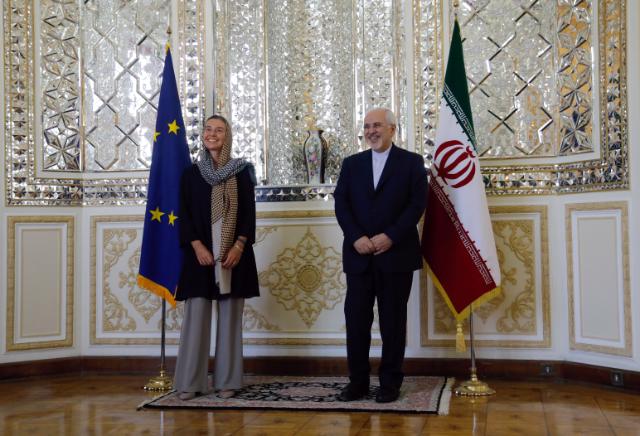Against the backdrop of raising tension and the risk of a military escalation between the US and Iran in the Gulf, the EU finds itself at odds with its own policy of salvaging the nuclear deal with Iran after its much-awaited paying mechanism for enabling legitimate trade with Iran has not yet become operational.
The nuclear deal signed in July 2015 (JCPOA = Joint Comprehensive Plan of Action) extended Iran’s estimated break-out capacity to produce a nuclear bomb to one year and placed restrictions on its nuclear programme for a period of up to 15 years. In beginning of May, however, Iran announced that it might stop complying with the JCPOA and resuming stockpiling and enriching uranium.
At a seminar on Friday (21 June) in Brussels, arranged by the Foundation for European Progressive Studies (FEPS) and the Italian think-tank Istituto Affari Internazionali (IAI), an official from the EU task force for Iran said that the European External Action Service (EEAS) was still “working day and night to make the mechanism operational”.
Some elements have been put in place by the three EU member states who signed the nuclear deal with Iran (E3 = UK, France and Germany) and took upon themselves to implement the mechanism but no trade deal with Iran has yet been closed.
The mechanism (Instex = Instrument in support of trade exchanges) is based on a barter system and has been in the pipeline since last year when EU foreign policy chief Federica Mogherini announced it under much fanfare. Since then EU/E3 has worked secretly, without disclosing any details to the outside world. Even Sweden, known for its open data principle, refused to disclose any information.
Iran, under heavy economic pressure since the US unilaterally withdrew from the deal in May 2018 and started to reimpose sanctions on Iran, expected from the EU that it would come to its rescue and keep its part of the deal but found it frustrating that the preparations for the paying instrument dragged on.
At the seminar, the two organisers presented a report, based on one year of research and engagement with Iran, on Europe-Iran relations (“Europe and Iran in a Fast-Changing Middle East”). According to its final chapter with recommendations for the EU, “the JCPOA is on life support”.
The report states that Instex so far has been more of a political statement and anyway is limited to trade in humanitarian goods while Iran wants to export oil and earn much needed revenues after the US cancelled its oil waivers. The instrument would need an injection of public money and opened up to countries that are willing to buy Iranian oil.
Seyed Mohammad Kazem Sajjadpour, Deputy Foreign Minister of Iran and President of Institute for Political and International Studies (IPIS) in Tehran, presented a conceptual framework at the seminar for understanding EU-Iran relations and recalled the often century-long relations between Europe and Iran.
“Europe played a significant role in the nuclear deal”, he said, “but the American withdrawal from it has changed everything. The policy of maximum pressure on Iran will only result in maximum resistance on our part.”
He was unwilling to comment on the current tension in the region and called on Europe to try to better understand Iran. He does not take any interviews and declined to respond to a question from The Brussels Times why Iran, incl. its supreme leader, continues to threaten Israel with annihilation instead of calming down the situation in the region.
IAI, the Italian think-tank which produced the report, describes the threats as rhetoric and tends to explain Iran’s ballistic missile programme and other actions in the region as mainly defensive. The crux of the matter is that such “rhetoric” is counterproductive to a solution of the Israeli-Palestinian conflict and can easily result in military escalation.
EEAS shares the concerns about Iran’s missile program and destabilizing actions in the region but has decided to keep them outside any renegotiating of the nuclear deal. While it rejected Iran’s announcement in May as ultimatums, it will wait for next monitoring report from the International Atomic Energy Agency before making any judgement on Iran’s compliance with the JCPOA.
Mogherini will be replaced in a few months when the new European Commission takes over. Without success in preserving the JCPOA, she will leave a thin foreign policy legacy, with several conflicts unsolved, such as those in Ukraine, Syria and Yemen, and the EU will remain a payer of financial assistance and not a significant policy player.
M.Apelblat
The Brussels Times

